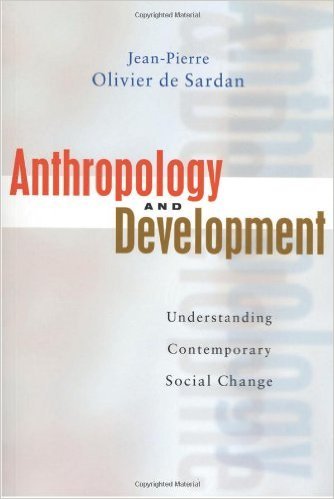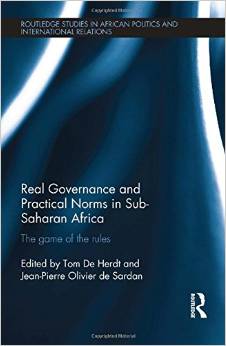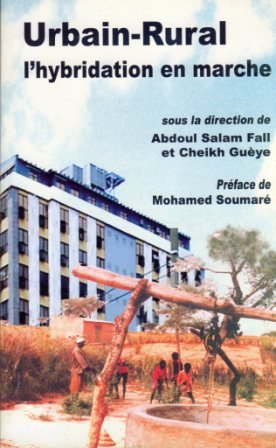
par Admin-Apad | 11 Oct 2015
Olivier de Sardan J.P., Anthropology and development, understanding contemporary social change, London, Zed Books, 2005, 256 p.
This book re-establishes the relevance of mainstream anthropological (and sociological) approaches to development processes and simultaneously recognizes that contemporary development ought to be anthropology‘s principal area of study. Professor de Sardan argues for a socio-anthropology of change and development that is a deeply empirical, multidimensional, diachronic study of social groups and their interactions.
The Introduction provides a thought-provoking examination of the principal new approaches that have emerged in the discipline during the 1990s. Part I then makes clear the complexity of social change and development, and the ways in which socio-anthropology can measure up to the challenge of this complexity. Part II looks more closely at some of the leading variables involved in the development process, including relations of production; the logics of social action; the nature of knowledge; forms of mediation; and ‘political‘ strategies.
Following its successful publication in French, this important book will provoke much thoughtful debate within Anthropology, Sociology and Development Studies.

par Admin-Apad | 25 Juin 2015
Olivier de Sardan J.P., 2015, Epistemology, Fieldwork, and Anthropology, Palgrave Macmillan, 272 p.
Epistemology, Fieldwork, and Anthropology provides a systematic examination of the empirical foundations of interpretations and grounded theories in anthropology. Olivier de Sardan explores the nature of the links between observed reality and the data produced during fieldwork, and between the data gathered and final interpretative statements. Olivier de Sardan’s research asks how anthropologists develop a ‘policy of fieldwork’, what the advantages and limits of observation are, and if the dangers of over-interpretation and scientific ideologies be minimized. Exploring the space between epistemology and methodology, the book critically juxtaposes Anglo and Francophone writings about fieldwork, plausible interpretations, emicity, reflexivity, comparison, and scientific rigor.
(translation of “la rigueur du qualitatif”)
http://www.palgrave.com/page/detail/epistemology,-fieldwork,-and-anthropology-jeanpierre-olivier-de-sardan/?sf1=barcode&st1=9781137488497

par Admin-Apad | 14 Juin 2015
Olivier de Sardan J.P. dir, Élections au village. Une ethnographie de la culture électorale au Niger (Les pouvoirs locaux au Niger, tome 2), Paris/Karthala, 348 p.
Cette analyse ethnographique détaillée des élections locales au Niger intègre celles-ci dans leurs contextes locaux, politiques, sociaux, culturels. Cette démarche originale explique qu’il s’agisse du second volume d’une série sur Les pouvoirs locaux au Niger.
Il s’agit d’un apport majeur à la socio-anthropologie des processus électoraux (en Afrique et au-delà), qui repose sur des enquêtes approfondies menées sur douze sites au sein d’un même pays par des chercheurs de ce pays, connaissant particulièrement bien les contextes locaux et utilisant une problématique commune. Un tel comparatisme intensif de proximité est peu fréquent dans les méthodes qualitatives. Portant sur l’ensemble du processus électoral, depuis l’établissement des listes électorales jusqu’à l’élection des maires par les conseils municipaux, les résultats témoignent de comportements largement partagés par les militants des partis politiques et les cadres de l’administration, et dessinent ainsi les traits principaux d’une culture électorale nigérienne, très moderne, fondée sur des normes pratiques contournant bien souvent le code électoral, mais témoignant d’une réelle appropriation de l’institution électorale à travers diverses techniques de jeu avec les règles du jeu.
http://www.karthala.com/voix-dafrique/2960-elections-au-village-une-ethnographie-de-la-culture-electorale-au-niger-les-pouvoirs-locaux-au-niger-tome-2-9782811113773.html

par Admin-Apad | 29 Mai 2015
Real Governance and Practical Norms in Sub-Saharan Africa. The game of the rules
Edited by Tom De HERDT, Jean-Pierre OLIVIER de SARDAN
Routledge – 2015 – 268 pages
Series: Routledge Studies in African Politics and International Relations
Although international development discourse considers the state as a crucial development actor, there remains a significant discrepancy between the official norms of the state and public services and the actual practices of political elites and civil servants.
This text interrogates the variety of ways in which state policies and legal norms have been translated into the set of practical norms which make up real governance in sub-Saharan Africa. It argues that the concept of practical norms is an appropriate tool for an ethnographic investigation of public bureaucracies, interactions between civil servants and users, and the daily functioning of the state in Africa. It demonstrates that practical norms are usually different from official norms, complementing, bypassing and even contradicting them. In addition, it explores the positive and negative effects of different aspects of this ‘real governance’.
This text will be of key interest to academics, students and researchers in the fields of development, political science, anthropology and development studies, African studies, international comparative studies, implementation studies, and public policy.
http://www.routledge.com/books/details/9781138852587/

par Admin-Apad | 10 Mai 2015
Fall, A.S. et Gueye C. dir, 2005, Urbain-rural, l’hybridation en marche, Etudes et recherches 240-241-242-243, Dakar, Enda Tiers-Monde
Cet ouvrage, co-édité par Enda Tiers-Monde et l’APAD, tente de déconstruire dans leur confinement et leurs articulations, les concepts pourtant fondamentaux d’urbain et de dural, pour démontrer que c’est dans leurs entre-deux que les deux milieux s’inventent et trouvent de nouveaux ressorts à leur évolution. Il exprime l’intérêt renouvelé d’Enda pour les relations urbain-rural et sa volonté dans ses actions et ses réflexions, d’œuvrer pour le décloisonnement entre les deux milieux. Les contributions, à partir d’exemples pris dans divers pays africains et en France, ont été sélectionnées à l’issue d’un colloque organisé par l’APAD en partenariat avec le CTA de l’Union européenne, l’IRD, et tenu à Saint-Louis du Sénégal en 2000.







Recent Comments